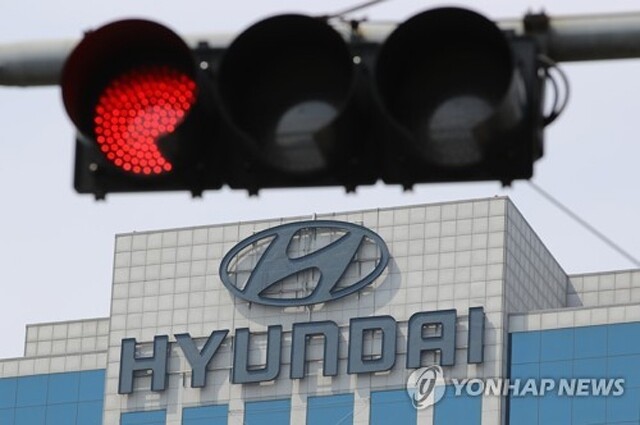hankyoreh
Links to other country sites 다른 나라 사이트 링크
[Editorial] Hyundai Motor persecutes whistleblower; is it really a global corporation?

After firing an employee who leaked information about faulty vehicles to the government and the media, Hyundai Motor has rejected the recommendation of South Korea‘s Anti-Corruption and Civil Rights Commission (ACRC) to reinstate that employee. This can only be seen as a reprisal against a whistle-blower.
After the ACRC recently decided to take steps to protect Kim Gwang-ho, former head of the Hyundai team for improving supplier quality, as a public interest whistle-blower, Hyundai refused to accept the commission’s decision and has asked the Seoul Administrative Court to reverse the decision. “When Kim leaked that information, he was acting justly with the goal of protecting consumers’ rights,” the commission said on Mar. 13, recommending that Hyundai Motor reverse its unfair termination of Kim and reinstate him to his original position.
In Sep. 2016, Kim informed the media and South Korea’s Ministry of Land, Infrastructure and Transport that “Hyundai had known about 32 product quality defects, including some in the Theta II engine, but covered them up instead of issuing a recall or taking other appropriate measures.” He also claimed that Hyundai was discriminating against South Korean consumers, citing the company‘s decision to recall Sonatas in the US that have the Theta II engine. Hyundai responded by firing Kim in Nov. 2016 for violating the company’s security policy. “The documents that Kim leaked without permission amounted to company business secrets,” the company said.
But the information leaked by Kim triggered a massive recall related to the defects with Hyundai’s Theta II engine. During an investigation of Kim’s documents, the Ministry of Land, Infrastructure and Transport confirmed that there were design flaws. With the Ministry about to order a compulsory recall, Hyundai announced on Apr. 7 its plans to issue a “voluntary recall” for more than 170,000 vehicles from five models, including the Grandeur and the Sonata. Defects in engine parts on more than 68,000 vehicles in the Genesis and Equus lines that the Ministry announced on Apr. 11 also turned up during the Ministry’s investigation of Kim’s documents. The Ministry asked Hyundai to issue a voluntary recall; if the company does not comply within 30 days, the Ministry intends to hold a hearing and then to order a mandatory recall.
Despite these circumstances, Kim has not been reinstated to his position at Hyundai - instead, he is in danger of being criminally prosecuted. Along with firing Kim, Hyundai Company has filed a complaint with Prosecutors charging him with leaking trade secrets. Hyundai’s over-the-top response seems to go beyond mere retribution against Kim as an individual and to be intended to nip other would-be whistle-blowers in the bud.
But muzzling whistle-blowers will not change a thing. Perhaps such employees will stay quiet for the time being, but in the long run, this will ruin the company. What Hyundai ought to be focusing on right now is not retaliating against whistle-blowers but quality control and customer satisfaction. That’s the course that a first-rate global corporation ought to take.
Please direct questions or comments to [english@hani.co.kr]

Editorial・opinion
![[Column] Park Geun-hye déjà vu in Yoon Suk-yeol [Column] Park Geun-hye déjà vu in Yoon Suk-yeol](https://flexible.img.hani.co.kr/flexible/normal/500/300/imgdb/original/2024/0424/651713945113788.jpg) [Column] Park Geun-hye déjà vu in Yoon Suk-yeol
[Column] Park Geun-hye déjà vu in Yoon Suk-yeol![[Editorial] New weight of N. Korea’s nuclear threats makes dialogue all the more urgent [Editorial] New weight of N. Korea’s nuclear threats makes dialogue all the more urgent](https://flexible.img.hani.co.kr/flexible/normal/500/300/imgdb/original/2024/0424/7317139454662664.jpg) [Editorial] New weight of N. Korea’s nuclear threats makes dialogue all the more urgent
[Editorial] New weight of N. Korea’s nuclear threats makes dialogue all the more urgent- [Guest essay] The real reason Korea’s new right wants to dub Rhee a founding father
- [Column] ‘Choson’: Is it time we start referring to N. Korea in its own terms?
- [Editorial] Japan’s rewriting of history with Korea has gone too far
- [Column] The president’s questionable capacity for dialogue
- [Column] Are chaebol firms just pizza pies for families to divvy up as they please?
- [Column] Has Korea, too, crossed the Rubicon on China?
- [Correspondent’s column] In Japan’s alliance with US, echoes of its past alliances with UK
- [Editorial] Does Yoon think the Korean public is wrong?
Most viewed articles
- 1‘We must say no’: Seoul defense chief on Korean, USFK involvement in hypothetical Taiwan crisis
- 2N. Korean delegation’s trip to Iran shows how Pyongyang is leveraging ties with Moscow
- 3Amnesty notes ‘erosion’ of freedom of expression in Korea in annual human rights report
- 4‘Weddingflation’ breaks the bank for Korean couples-to-be
- 5[Reportage] On US campuses, student risk arrest as they call for divestment from Israel
- 6[Column] Park Geun-hye déjà vu in Yoon Suk-yeol
- 7Korea sees more deaths than births for 52nd consecutive month in February
- 8[Editorial] New weight of N. Korea’s nuclear threats makes dialogue all the more urgent
- 9Will NewJeans end up collateral damage in internal feud at K-pop juggernaut Hybe?
- 10[Guest essay] The real reason Korea’s new right wants to dub Rhee a founding father